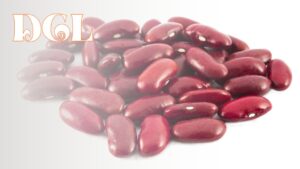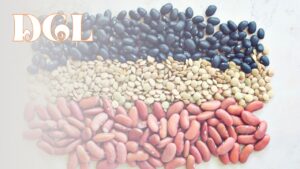Hey there! So, you’re probably wondering if kidney beans are good for your furry friend. Well, I’ve got some answers for you.
In this article, we’ll dive into the nutritional value of kidney beans and explore the potential benefits they may have for dogs. But, we’ll also talk about the risks and considerations you need to keep in mind. Safety comes first, after all!
If you’re thinking about incorporating kidney beans into your dog’s diet, we’ll also discuss how to prepare them properly. And don’t worry, if kidney beans aren’t the right fit for your pup, we’ll explore alternative protein sources too. Allergies and intolerances are important to consider, so we’ll cover the signs to watch out for.
Plus, we’ll share some real-life experiences and testimonials to give you a well-rounded perspective.
So, let’s get started and find out if kidney beans are a good choice for your furry companion!
- Overview of Kidney Beans Nutritional Value
- Potential Benefits of Kidney Beans for Dogs
- Risks and Considerations
- How to Safely Prepare Kidney Beans for Dogs
- Alternative Protein Sources for Dogs
- Consulting with a Veterinarian
- Signs of Kidney Bean Allergy or Intolerance in Dogs
- Real-Life Experiences and Testimonials
- Frequently Asked Questions about Feeding Kidney Beans to Dogs
- Conclusion and Final Thoughts
- Frequently Asked Questions
- Conclusion
Overview of Kidney Beans Nutritional Value
Kidney beans possess a remarkable nutritional value that can greatly benefit your canine companion. These beans are packed with essential nutrients that can support your dog’s overall health and well-being.
Kidney beans are an excellent source of protein, which is important for muscle development and repair. They also contain a good amount of dietary fiber, which aids in digestion and helps maintain a healthy weight.
In addition to protein and fiber, kidney beans are rich in vitamins and minerals. They are a great source of iron, which is crucial for the production of red blood cells and oxygen transport in the body. Kidney beans also provide potassium, which supports proper nerve and muscle function.
However, it is important to note that kidney beans should be cooked thoroughly before feeding them to your dog. Raw or undercooked kidney beans can be toxic and cause gastrointestinal upset. Soaking and boiling the beans can help remove any potential toxins and make them safe for consumption.
While kidney beans can be a nutritious addition to your dog’s diet, it’s important to consult with your veterinarian before making any changes. They can provide guidance on the appropriate amount and frequency of kidney beans for your specific dog, taking into consideration their individual nutritional needs and any existing health conditions.

Potential Benefits of Kidney Beans for Dogs
There are potential advantages that can come from incorporating kidney beans into your canine companion’s diet. Not only are kidney beans a great source of plant-based protein, but they also provide a good amount of fiber.
Here are some potential benefits of including kidney beans in your dog’s diet:
- Improved Digestion: The fiber content in kidney beans can help regulate your dog’s bowel movements and promote a healthy digestive system. This can be particularly beneficial for dogs with sensitive stomachs or those prone to constipation.
- Weight Management: The high fiber and protein content in kidney beans can help your dog feel fuller for longer, which may aid in weight management. Adding kidney beans to your dog’s meals can help them maintain a healthy weight or even shed a few pounds if needed.
- Nutrient Boost: Kidney beans are rich in various vitamins and minerals, including iron, potassium, and folate. Incorporating kidney beans into your dog’s diet can provide them with these essential nutrients, supporting their overall health and well-being.
- Reduced Risk of Chronic Diseases: The antioxidants found in kidney beans can help fight against free radicals and reduce the risk of chronic diseases, such as heart disease and certain types of cancer.
By adding kidney beans to your dog’s diet in moderation and consulting with your veterinarian, you can potentially enhance their nutrition and contribute to their overall health.
Risks and Considerations
It’s crucial to be aware of potential risks and considerations before incorporating these legumes into your furry friend’s diet. While kidney beans can provide some benefits to dogs, it’s important to remember that they should be cooked thoroughly and served in moderation. Raw kidney beans contain a compound called lectin, which can be toxic to dogs and cause gastrointestinal upset. However, cooking kidney beans destroys this harmful compound and makes them safe for consumption.
Another consideration is the high fiber content of kidney beans. While fiber is beneficial for dogs in small amounts, too much can cause digestive issues such as gas and bloating. It’s important to introduce kidney beans slowly into your dog’s diet and monitor their response.
Additionally, kidney beans should not be the main source of protein in your dog’s diet. Dogs require a balanced diet that includes high-quality animal-based proteins. Kidney beans can be a complementary addition to their meals, but they should not replace the necessary nutrients found in meat or other animal proteins.
Incorporating kidney beans into your dog’s diet can provide some benefits, but it’s essential to consider these risks and use them as a supplement rather than a primary source of nutrition.
| Pros | Cons | Considerations |
|---|---|---|
| Good source of fiber | Raw beans are toxic | Introduce slowly |
| Cooked beans are safe | Excessive fiber can cause digestive issues | Not a main protein source |
| Can be a complementary addition | Should not replace necessary nutrients | Monitor your dog’s response |
How to Safely Prepare Kidney Beans for Dogs
When it comes to preparing kidney beans for my dog, there are a few key points I always keep in mind.
First, I make sure to use cooking methods that remove any toxins present in the beans. This typically involves soaking and boiling them thoroughly.
Second, I pay careful attention to portion sizes, as too many kidney beans can cause digestive issues for my dog.
And finally, I introduce kidney beans into my dog’s diet gradually, to ensure they are well-tolerated and don’t cause any adverse reactions.
Cooking Methods to Remove Toxins
One effective way to eliminate toxins from kidney beans is by cooking them thoroughly.
There are several cooking methods that can help ensure the removal of toxins and make the beans safe for dogs to consume.
The most common method is boiling the beans in water for at least 10 minutes. This helps break down the toxins and makes them less harmful.
Another option is pressure cooking, which can further enhance the removal of toxins.
Soaking the beans overnight before cooking can also help reduce toxins, but it is important to discard the soaking water and cook the beans in fresh water.
It’s crucial to remember that raw or undercooked kidney beans can be toxic to dogs, so always make sure they are properly cooked before serving them to your furry friend.
Proper Portion Sizes
To ensure your furry friend gets the right amount of this nutritious food, be mindful of the portion sizes you serve. Just like humans, dogs need a balanced diet to stay healthy. Here are some guidelines to help you determine the proper portion sizes for kidney beans:
- Start by consulting with your veterinarian to determine the appropriate portion size for your dog based on their age, size, and overall health.
- Consider your dog’s daily caloric needs and factor in the kidney beans as part of their overall meal plan.
- Remember that kidney beans should only make up a small portion of your dog’s diet, typically no more than 10%.
- It’s important to introduce kidney beans gradually and monitor your dog for any digestive issues or allergic reactions.
By following these portion size guidelines, you can ensure that kidney beans are a nutritious addition to your dog’s diet.
Introducing Kidney Beans to the Diet
If you want to give your furry friend a healthy surprise, try slowly incorporating kidney beans into their meal plan. It’s important to introduce new foods gradually to avoid any digestive upsets.
Start by adding a small amount of cooked kidney beans to their regular food and observe how they react. Kidney beans are a great source of protein, fiber, and essential vitamins and minerals for dogs. They can provide an extra boost to their overall health and well-being.
Just make sure to cook the kidney beans thoroughly and avoid using any seasonings or additives that may be harmful to dogs. Remember, moderation is key. Too many kidney beans can cause digestive issues, so it’s best to consult with your veterinarian to determine the appropriate portion size for your pup.
Alternative Protein Sources for Dogs
Dogs love the taste of alternative protein sources like kidney beans! If you’re looking to introduce something new and nutritious to your furry friend’s diet, there are several options to consider.
One alternative protein source that dogs can enjoy is lean chicken. It provides them with essential amino acids and is a great source of protein.
Another option is fish, such as salmon or tuna. Fish is rich in omega-3 fatty acids, which can promote a healthy coat and skin for your pup.
Additionally, eggs can be a great alternative protein source for dogs. They are packed with nutrients and can be served boiled or scrambled.
If you’re looking for a plant-based alternative, lentils are a fantastic option. They are high in protein and fiber, which can aid in digestion.
Quinoa is another plant-based protein source that dogs can enjoy. It is packed with essential amino acids and is easily digestible for our furry friends.
Lastly, if you’re feeling adventurous, you can try feeding your dog tofu. It is an excellent source of protein and can be a great addition to their meals.
Remember, it’s always important to consult with your veterinarian before introducing any new foods into your dog’s diet. They can provide guidance on portion sizes and ensure that the alternative protein sources you choose are safe and suitable for your pup.

Consulting with a Veterinarian
After researching alternative protein sources for dogs, I realized that it’s crucial to consult with a veterinarian before making any significant changes to my dog’s diet. Each dog has unique nutritional needs, and a vet can provide expert guidance based on their specific health requirements.
Consulting with a veterinarian ensures that any alternative protein sources I consider, including kidney beans, are suitable and safe for my furry friend.
During a consultation, a vet can assess my dog’s overall health, take into account any existing medical conditions or allergies, and provide personalized recommendations. They can guide me on the appropriate portion sizes and frequency of incorporating kidney beans or other alternative protein sources into my dog’s diet. Additionally, a vet can help me monitor my dog’s response to these changes and make any necessary adjustments along the way.
In conclusion, consulting with a veterinarian is an essential step when considering alternative protein sources for my dog, such as kidney beans. It ensures that I make informed decisions that promote my dog’s well-being and maintain their optimal health.
Markdown list:
- Expert guidance tailored to your dog’s specific needs
- Personalized recommendations for incorporating alternative protein sources
- Monitoring and adjusting your dog’s diet for optimal results
- Ensuring your dog’s overall well-being and health
Signs of Kidney Bean Allergy or Intolerance in Dogs
Before introducing alternative protein sources into your dog’s diet, it’s important to be aware of the signs that may indicate an allergy or intolerance. While kidney beans can be a nutritious addition to a dog’s diet, some dogs may have adverse reactions to them.
One of the most common signs of a kidney bean allergy or intolerance in dogs is digestive upset. This can include symptoms such as vomiting, diarrhea, or gas. If you notice any of these signs after giving your dog kidney beans, it’s important to consult with a veterinarian to determine the cause and appropriate course of action.
Another possible sign of an allergy or intolerance to kidney beans is skin irritation. Some dogs may develop itching, redness, or even hives after consuming kidney beans. If you notice any changes in your dog’s skin or coat, it’s important to monitor their reaction and seek veterinary advice if necessary.
In more severe cases, a dog may experience difficulty breathing or swelling of the face or throat after consuming kidney beans. These are signs of a potentially life-threatening allergic reaction and require immediate veterinary attention.
In conclusion, while kidney beans can be a healthy addition to a dog’s diet, it’s important to be aware of the signs of an allergy or intolerance. Monitoring your dog’s reaction and consulting with a veterinarian can help ensure their overall health and well-being.
Real-Life Experiences and Testimonials
When incorporating alternative protein sources into your furry friend’s diet, it’s crucial to consider the real-life experiences and testimonials from other pet owners.
As a dog owner myself, I wanted to share my experience with feeding kidney beans to my pooch.
I started giving kidney beans to my dog after hearing about their nutritional benefits. I was excited to introduce a new protein source that was also high in fiber and low in fat. However, I quickly noticed some changes in my dog’s behavior and health.
After a few days of including kidney beans in his diet, my dog started experiencing digestive issues. He had frequent bouts of diarrhea and seemed uncomfortable. I immediately stopped feeding him kidney beans and took him to the vet.
The vet confirmed that my dog was allergic to kidney beans. She explained that some dogs can develop allergies or intolerances to certain foods, and kidney beans were one of them. I felt guilty for not considering this possibility before introducing kidney beans into his diet.
Since then, I have been more cautious about adding new foods to my dog’s diet. I always consult with the vet and conduct thorough research. It’s essential to remember that every dog is unique, and what works for one may not work for another. So, always pay attention to your dog’s reactions and consult a professional if you notice any unusual symptoms.
Frequently Asked Questions about Feeding Kidney Beans to Dogs
Curious about incorporating kidney beans into your furry friend’s diet? Let’s dive into some frequently asked questions about feeding these protein-packed legumes to your canine companion.
- Are kidney beans safe for dogs? Yes, kidney beans are generally safe for dogs to eat, as long as they are cooked and served plain without any added seasonings or spices.
- Can dogs digest kidney beans? Yes, dogs can digest kidney beans, but it is important to cook them thoroughly to make them easier to digest and avoid any potential digestive issues.
- How much kidney beans can I feed my dog? It is recommended to feed kidney beans to dogs in moderation. A small portion, around a tablespoon or two, can be added to their regular diet as a healthy and nutritious addition.
- Are there any benefits to feeding kidney beans to dogs? Absolutely! Kidney beans are a great source of protein, fiber, and essential nutrients like iron, folate, and magnesium. They can help support your dog’s overall health and provide them with energy.
Incorporating kidney beans into your dog’s diet can be a nutritious addition, but always consult with your veterinarian first to ensure it is the right choice for your furry friend.
Conclusion and Final Thoughts
Incorporating these protein-packed legumes into your pup’s diet can be a healthy and nutritious choice, ensuring they receive essential nutrients and support their overall well-being. While kidney beans can be a beneficial addition to your dog’s diet, it’s important to remember that moderation is key. Feeding too many kidney beans to your furry friend can lead to digestive issues, such as gas and bloating.
It’s best to introduce kidney beans gradually, starting with small amounts and monitoring your dog’s reaction.
When feeding kidney beans to your dog, it’s crucial to prepare them properly. Raw kidney beans contain a naturally occurring toxin called lectin, which can be harmful to dogs if consumed in large quantities. To eliminate this toxin, kidney beans must be soaked and cooked thoroughly before feeding them to your pup. Soaking the beans overnight and then boiling them for at least 10 minutes will ensure that they are safe for your dog to consume.
In conclusion, kidney beans can be a nutritious addition to your dog’s diet when prepared and fed in moderation. They offer a good source of protein, fiber, and essential nutrients. However, it’s always best to consult with your veterinarian before making any significant changes to your dog’s diet. Your vet can provide personalized advice based on your dog’s specific needs and health conditions.
Remember, a balanced diet and regular exercise are key to keeping your furry friend happy and healthy.
Frequently Asked Questions
Can I feed kidney beans to my dog if they have a history of kidney problems?
If my dog has a history of kidney problems, I would not feed them kidney beans. These beans contain a high amount of protein, which can put extra strain on the kidneys. It’s best to consult with a veterinarian for appropriate dietary recommendations.
Are there any specific kidney bean varieties that are better for dogs?
There aren’t any specific kidney bean varieties that are better for dogs. It’s important to remember that kidney beans should be cooked thoroughly and only given to dogs in moderation to avoid any potential digestive issues.
Can kidney beans be given to dogs as a primary source of protein?
Kidney beans can be given to dogs as a primary source of protein, but they should not be the only protein source. Dogs need a balanced diet with a variety of proteins for optimal nutrition.
How often can I include kidney beans in my dog’s diet?
I can include kidney beans in my dog’s diet a few times a week. They are a good source of protein and can be a healthy addition to their meals.
Are there any potential side effects of feeding kidney beans to dogs?
Feeding kidney beans to dogs may have potential side effects. It’s important to note that some dogs may have difficulty digesting beans, leading to gas, bloating, or even gastrointestinal upset.
Conclusion
In conclusion, kidney beans can be a beneficial addition to a dog’s diet when prepared and fed in moderation. They are a good source of protein, fiber, and essential nutrients.
However, it is important to properly cook and prepare kidney beans to remove any toxins and make them easier for dogs to digest. It is also crucial to monitor for any signs of allergies or intolerance.
While kidney beans can be a healthy option, it’s always best to consult with a veterinarian before making any significant changes to your dog’s diet.


